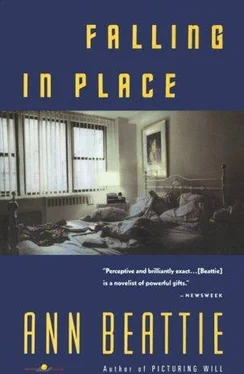Ann Beattie - Falling in Place
Здесь есть возможность читать онлайн «Ann Beattie - Falling in Place» весь текст электронной книги совершенно бесплатно (целиком полную версию без сокращений). В некоторых случаях можно слушать аудио, скачать через торрент в формате fb2 и присутствует краткое содержание. Год выпуска: 1991, Издательство: Vintage, Жанр: Современная проза, на английском языке. Описание произведения, (предисловие) а так же отзывы посетителей доступны на портале библиотеки ЛибКат.
- Название:Falling in Place
- Автор:
- Издательство:Vintage
- Жанр:
- Год:1991
- ISBN:нет данных
- Рейтинг книги:4 / 5. Голосов: 1
-
Избранное:Добавить в избранное
- Отзывы:
-
Ваша оценка:
- 80
- 1
- 2
- 3
- 4
- 5
Falling in Place: краткое содержание, описание и аннотация
Предлагаем к чтению аннотацию, описание, краткое содержание или предисловие (зависит от того, что написал сам автор книги «Falling in Place»). Если вы не нашли необходимую информацию о книге — напишите в комментариях, мы постараемся отыскать её.
Falling in Place — читать онлайн бесплатно полную книгу (весь текст) целиком
Ниже представлен текст книги, разбитый по страницам. Система сохранения места последней прочитанной страницы, позволяет с удобством читать онлайн бесплатно книгу «Falling in Place», без необходимости каждый раз заново искать на чём Вы остановились. Поставьте закладку, и сможете в любой момент перейти на страницу, на которой закончили чтение.
Интервал:
Закладка:
“You don’t know the name of her best friend?”
“Well,” his father said. “Aren’t we finding fault with our old dad left and right today.”
“Adamson,” John Joel said.
“I don’t care what her name is,” his father said.
“I was trying to tell you a really good joke the other night in the park, and you didn’t care about that, either.”
“What joke?”
“You don’t even remember.”
“I hear a lot of jokes. That’s what you do in the workaday world, my friend: You fend off disaster and listen to jokes.”
“I don’t want to go to the dentist.”
“What do you want to do? Lie in the tree?”
“I don’t always lie in the tree,” John Joel said.
“You’re acting like a five-year-old today.”
“You’re just taking me because she told you to.”
“No indeed,” John said. “I’m doing my best to insure a happy future for my son, so that when he goes out into the workaday world, people will take him seriously. They don’t take short men or men with buck teeth seriously. Read what Psychology Today says about what’s taken seriously. You with your beautiful straight teeth are going to be taken seriously, and then you can sit around and fend off disaster and listen to jokes. When you laugh, you’ll do it with a set of sparkling white teeth.”
“If you don’t want to take me, don’t take me. I don’t want to go.”
“How did we get into this? I got you an appointment. Seeing this guy is like getting in to see King Tut. He’s not going to do anything today. He’s just going to look at your teeth. Maybe take an X-ray.”
“But then he’s going to do something.”
“I can’t help it that your teeth are getting crooked.”
His father brought the car to a stop with a screech of tires that made the garage attendant look up and stare. His father sat there expressionless until the attendant came to the car. The attendant put a piece of paper under the windshield wiper and handed a smaller piece of paper to his father. His father put it in his inside pocket and he and John Joel got out of the car. Walking up the ramp, the attendant called: “How long?”
“Two o’clock,” John said. “ ‘Happy ever after in the market place,’ ” he sang under his breath.
They walked two blocks crosstown to the orthodontist’s office. His father pushed a buzzer and they were buzzed in. The receptionist was pregnant, wearing a T-shirt with “Baby” printed across it, and an arrow pointing down. She gave his father a form to fill out and smiled around him at John Joel. When she stood up to take the piece of paper back, John Joel stared at her huge stomach. She smiled again.
“I’ll wait and hear what he has to say,” his father said.
John Joel shrugged. “I’m not a baby,” he said.
“Can you remember what he said?”
“He hasn’t said anything yet,” John Joel said. It was useless; his father never knew when somebody was kidding, and there was no point in telling him it was a joke, because it had been such a lame one. “I’ll remember,” John Joel said.
“And you’re going to wait for Nick to pick you up, right? At eleven. He’ll be in the waiting room when you get out. Okay?”
“Why wouldn’t it be okay?” John Joel said.
What John had taken to be small photographs of teeth were, he realized, photographs of shells. There was also a basket of shells on the table in front of the couch, and there were small plastic stands that supported shells on the tables at either end of the room. An old Life magazine with Ike and Mamie smiling their round-faced smiles was on one table, along with the current issue of Variety , the National Enquirer and Commentary . John looked over the magazines, thinking that this orthodontist was going to cost. He was reluctant to leave John Joel. At his son’s age, he would have waited for his father to leave and then bolted. The pregnant receptionist wouldn’t have had a chance of catching him. He looked at John Joel, slumped in a chair, leafing through a magazine, and decided that his son would do no such thing. Mary was right that John Joel hated to exert himself. He was fat and pale, and the braces were going to make him look even more like the Cheshire cat.
“Okay, I’ll take off,” he said. “I’ll see you and Nick outside of the museum.”
“How come Nick’s taking me to the museum?”
“Because he wasn’t going to be busy today. He said he’d like to.”
John Joel shrugged.
“Okay,” John sighed. “See you at lunchtime.”
“So are we going to another Fourth of July party on that guy’s roof?”
“What did you say?” John was halfway across the room when he heard his son speaking to him. “You’re talking about the party last year?”
“Yeah. Are we going again?”
“Do you want to go again?”
“I just wanted to know.”
“Well, I just want to know if you want to go again. That’s not a complicated question, is it?”
“I liked that roof. I just didn’t like the fireworks.”
“I don’t think he lives there anymore. I think he moved to the East Side a couple of months ago.”
“He wasn’t a good friend of yours?”
“No. Why?”
“So how come you went to his party?”
“I work with him. He invited me. How come you’re so talkative all of a sudden?”
“I just wanted to know.”
“I don’t think he’s having a party this year.”
“No big deal,” John Joel said.
John sat down again, thinking that John Joel must have started that conversation to get him to stay. Maybe he was afraid of going to see the orthodontist, or maybe he doubted that Nick would show up. John picked up a magazine.
“I thought you were going,” John Joel said.
“Do you want me to go?”
“Sure,” John Joel said.
John sighed and got up. He tried to open the door, but he had to catch the receptionist’s eye to be buzzed out. She looked at him suspiciously. She looked at him the way his mother would look at him if she knew that he was leaving John Joel alone. She always acted like New York was a huge cage that you walked into, with animals about to leap when you made the first sudden move. She was always jumpy in New York. It was the one thing she had in common with Louise. The most innocent things disturbed Louise: water gushing from a fire hydrant, a woman leaning out a window who was obviously only going to water her plants. Every siren made her turn her head; everyone who stared at her in a subway car was going to follow her off. In the beginning, he had only thought about making her happy by moving them to the suburbs. Now she hated him for being able to cope with the city when she couldn’t. And she hated the suburbs because there weren’t any intelligent people. Tiffy was intelligent. Only Tiffy. The truth was, she liked normal intelligent people, and they were hard to find. Even Nick was too strange for her. A cowboy hat and a black date made him, in her mind, no different from an extra in a Fellini movie. Horst, who had had the Fourth of July party the year before, couldn’t have been as normal as he seemed if he slept in his sleeping bag, naked. Which part of that is odd? John had asked her. “Both parts,” she had said. He had hoped that just the sleeping bag would seem odd.
He went into a coffee shop, feeling guilty for leaving John Joel alone in the doctor’s office. But he hated to treat him like a child, the way Louise did. Maybe letting him handle it on his own would give him self-confidence. He drank a black coffee, pouring a little water into the cup to cool it while two men who worked there argued about what song titles ought to be put in the jukebox. A tall fat man sitting on a stool at the counter kept whispering to them, cupping his hand over a piece of paper. “ ‘Greek selection’ is good enough,” one said, and the other hit him with a dishtowel, saying, “The songs have names. You think all Greek songs are ‘Never on Sunday’?” Finally, both men had towels and were slapping each other’s shoulders. Two women waited by the cash register. “ ‘Oh you can kiss me on a Mon-day, a Mon-day, a Mon-day,’ ” one man sang, and the tall fat man shrugged in disgust. The other man swatted the man who was dancing and singing. “Can I have a bagel and a coffee to go?” one of the women by the cash register said. “ ‘Or you can kiss me on a Tues-day, a Tues-day, a Tues-day, a Tues-day’s very good,’ ” the man sang. He was jumping in the air and clicking his heels together, hands cupped over his head. “ ‘Greek selection,’ ” the other man said. “Just write it down, and that’s that.” The tall man put his head in his hands and let it all go on. One of the women walked out, but the one who had asked for the bagel just gave her order again. John left a dollar, without asking for a check, and went out. The coffee had given him a lift. He looked up at the sky: still overcast, but a few breaks of light. He checked his watch and went to the corner and looked for a cab. Cabs came by him so fast that they looked like they had been launched. Finally he saw an empty one and hailed it. “Thirty-ninth and Fifth,” he said.
Читать дальшеИнтервал:
Закладка:
Похожие книги на «Falling in Place»
Представляем Вашему вниманию похожие книги на «Falling in Place» списком для выбора. Мы отобрали схожую по названию и смыслу литературу в надежде предоставить читателям больше вариантов отыскать новые, интересные, ещё непрочитанные произведения.
Обсуждение, отзывы о книге «Falling in Place» и просто собственные мнения читателей. Оставьте ваши комментарии, напишите, что Вы думаете о произведении, его смысле или главных героях. Укажите что конкретно понравилось, а что нет, и почему Вы так считаете.












